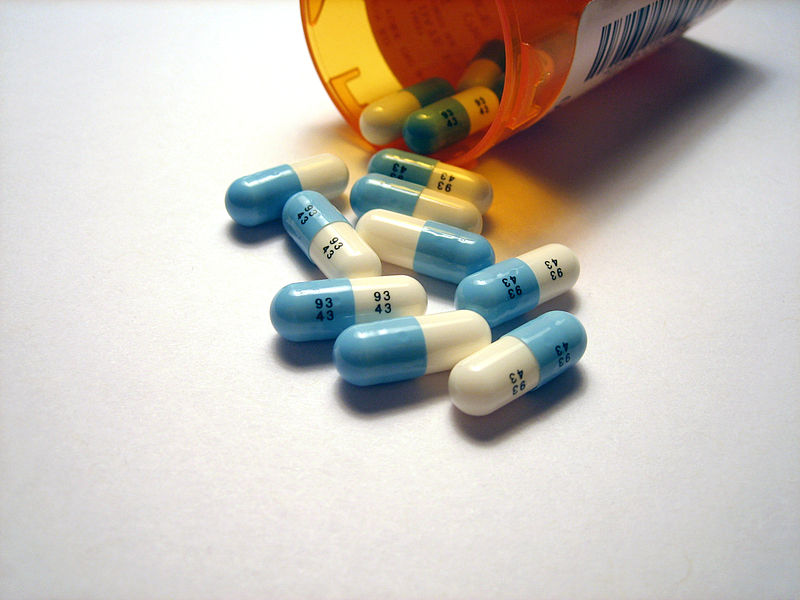Antidepressant shaming is worsening the mental health epidemic
December 5, 2018
I have been on antidepressants since I was 18. Some people told me I was too young to take them. Others told me I should not depend on a pill. I was told if I just exercised, ate healthy and thought positively, my state of mind would change. I made an effort to do all of those things already and unsurprisingly, I still had terrible anxiety and depression that interfered with my everyday life. It wasn’t until I overcame the negativity I was spewed about antidepressants and took my mental health into my own hands that I began to see a real change in the way I saw life.
Antidepressants, as the name alludes, are a drug used to treat depression. They also can be used to treat other issues, such as anxiety disorders and sleeping problems. The National Center for Health Statistics states that 118 million prescriptions for antidepressants each year in the United States, making them the third most common class of prescribed drugs in the US.
Medication for psychiatric disorders are given a negative connotation, specifically antidepressants. According to NBC, one in six Americans take medication for a mental disorder, most commonly for depression and anxiety. Many people report feeling lower levels of anxiety and depression from taking antidepressants, yet for some reason, they are still demonized.
Despite being one of the most commonly prescribed medications in the US, there is a lot of fear behind taking medication for depression. Scaremongering tactics have been used to keep people from taking antidepressants and psychiatric medications. An emphasis on all possible side effects are used to keep people away from the drugs, as if they are the only prescription drugs available that carry side-effects.
For example, people often fear the “zombie-effect,” the feeling of being separated from your surroundings and emotions. People fear the blunting of their emotions and the inability to portray feeling, though side effects like these aren’t common for every person taking medication. Painting antidepressants as being soul-sucking doesn’t do anyone any favors. Those who struggle with mental illness should be able to treat their disorder just as they would with any other illness.
Like any other medication available, antidepressants have their fair-share of side effects. Depression is a life-threatening illness, relating directly to an increase in suicide rates. The Center for Disease Control and Prevention revealed in a recent study suicide rates have increased 33 percent since 1999. Letting it slip under the rug and feeding the negative stigma will only continue to make things worse.
It is important to note that one side effect of antidepressants is, ironically, suicidal thoughts. This also keeps many people from doing things to better their mental health. While this side effect can be a reality, doctors should give frequent check-ups to their patients and encourage therapy along with the medication. In order to limit this negative side effect that may come up, doctors should keep an eye on their patients to make sure that treatment is working as it should. While antidepressants can help the issues of depression, considering all outcomes and side effects is crucial.
This stigma has lead to about only half of the population living with depression to actually receive any treatment for their illness. Some of the people who may need the help most will never seek it out due to the shame directed toward mental health.
Some of the most harmful effects of this stigma can be seen with teenagers and young adults dealing with depression. While still living with their parents, it can be hard for them to seek out help for their issues without their parents knowing. Some parents are stuck on the old-fashioned idea that depression is just a phase or a weakness that can eventually be overcome, leaving many young people feeling hopeless and trapped by the disease. Doctors should not be able to give teenagers and young adults medication without their parents permission, which leaves parents to make the decision for their children. Instead of worrying about the stigma, parents should understand the ways medication could help their children if they need it and save them from further deterioration of their mental health.
By not allowing young people to receive help for mental health, they run the risk of letting a mental illness become increasingly difficult into adulthood. As they are trying to develop their livelihoods through school and eventually a career, that growth can be hindered by the very real effects of depression and anxiety. Pretending depression doesn’t exist won’t make it any better. Instead, it will only worsen the growing problem we have in the United States regarding mental health.
Medication is not the answer for everyone, and it should not be the first and only line of defense. But by further instilling the negative stigma behind mental health, the problem will only continue to get worse.
It is time for all stigmas to be left in the past and let a focus on mental health commence, as far too many people are suffering in silence. Those suffering with mental illness deserve the right to shamelessly seek treatment for their struggles without the negative societal opinion keeping them from doing so.





















Luisa • Dec 6, 2018 at 7:00 pm
Thank you for this very important article on stigma around anti-depressants. I face that reality often when I bring up the subject with friends and acquaintances… Outside the medical profession, many folks appear to be more preoccupied to mention possible side effects than to check on whether the medication works well for me. Sadly, many fall victim to this stigmatization, including my younger sister who died of breast cancer over a decade ago, having refused to be medicated for depression, which she suffered from, for fear of stigmatization. I often wonder if she might have fought harder against cancer had she been treated also with anti-depressants. Fortunately these days some organizations, like the Carter Center, in Atlanta, Georgia, are fighting the stigma by conducting various awareness programs, including media training and stipends to journalists who decide to include mental health coverage in their news reports.